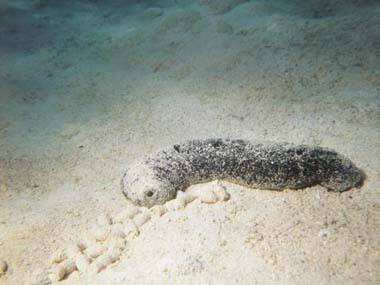London: Sea cucumbers and sea urchins are able to change the elasticity of collagen within their bodies, and could hold the answer to looking young, according to a new study. Researchers from the Queen Mary, University of London investigated the genes of marine creatures such as sea urchins and sea cucumbers, known as echinoderms. [caption id=“attachment_476717” align=“alignleft” width=“380”]
 Sea cucumber. Getty Images[/caption] They found the genes for “messenger molecules” known as peptides, which are released by cells and tell other cells in their bodies what to do. “Probably the most excing discovery from our research was finding genes encoding peptides that cause rapid stiffening or softening of collagen in the body wall of sea cucumbers,” lead researcher, Professor Maurice Elphick, said. “Although sea urchins and sea cucumbers may not look much like us, we are actually quite closely related to them. As we get older, changes in collagen cause wrinkling of our skin, so if we can find out how peptides cause the body wall of a sea cucumber to quickly become stiff or soft then our research might lead to new ways to keeping skin looking young and healthy,” Elphick said in a statement. The scientists analysed the DNA sequences of thousands of genes in the purple sea urchin Strongylocentrotus purpuratus and the edible sea cucumber Apostichopus japonicus and specifically searched for genes encoding peptide messenger molecules. “We found that sea urchins have a peptide that is very similar to calcitonin, a hormone that regulates our bones to make sure that they remain strong,” Elphick said. “So it will be fascinating to find out if calcitonin-type peptides have a similar sort of role in spiny-skinned creatures like sea urchins,” Elphick added. The study was published in the journals PLOS One and General and Comparative Endocrinology. PTI
Sea cucumber. Getty Images[/caption] They found the genes for “messenger molecules” known as peptides, which are released by cells and tell other cells in their bodies what to do. “Probably the most excing discovery from our research was finding genes encoding peptides that cause rapid stiffening or softening of collagen in the body wall of sea cucumbers,” lead researcher, Professor Maurice Elphick, said. “Although sea urchins and sea cucumbers may not look much like us, we are actually quite closely related to them. As we get older, changes in collagen cause wrinkling of our skin, so if we can find out how peptides cause the body wall of a sea cucumber to quickly become stiff or soft then our research might lead to new ways to keeping skin looking young and healthy,” Elphick said in a statement. The scientists analysed the DNA sequences of thousands of genes in the purple sea urchin Strongylocentrotus purpuratus and the edible sea cucumber Apostichopus japonicus and specifically searched for genes encoding peptide messenger molecules. “We found that sea urchins have a peptide that is very similar to calcitonin, a hormone that regulates our bones to make sure that they remain strong,” Elphick said. “So it will be fascinating to find out if calcitonin-type peptides have a similar sort of role in spiny-skinned creatures like sea urchins,” Elphick added. The study was published in the journals PLOS One and General and Comparative Endocrinology. PTI
Can marine animals help you look younger?
FP Archives
• October 2, 2012, 15:34:05 IST
Researches said that the elasticity of collagen within the bodies and could hold the answer to looking young
Advertisement
)